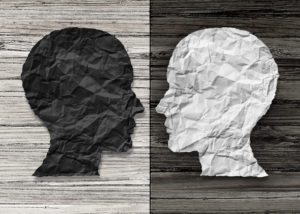
According to the International Bipolar Foundation, about 5.7 million Americans over the age of 18 have bipolar disorder.
Bipolar Disorder, also known as manic-depressive illness, is a brain disorder that causes extreme shifts in a person’s mood and energy, affecting their ability to carry out daily tasks. There are four main classifications of Bipolar Disorder, each of which are marked by extreme mood swings that include periods, known as mood episodes, of mania, depression and hopelessness.
Classifications of Bipolar Disorder
- Bipolar I Disorder — People suffering from this version of the disorder usually have manic episodes that last at least 7 days, sometimes with manic symptoms so severe that the person requires hospital care. Depressive episodes often last over two weeks in people with Bipolar I Disorder.
- Bipolar II Disorder — People suffering from this classification have depressive episodes and hypomanic episodes, which are less severe than manic episodes.
- Cyclothymic Disorder (Cyclothymia) — Cyclothymia is defined by multiple periods of hypomanic symptoms and multiple periods of depressive symptoms that last for at least two years. These symptoms do not meet diagnostic requirements for hypomanic and depressive episodes.
- Unspecified or Other Specified Bipolar Disorder — These diagnoses feature Bipolar Disorder symptoms that don’t match the other three categories.

Signs of Bipolar Disorder
Manic Episode
- Increased levels of energy
- Excessive feelings of euphoria
- Restlessness
- Denial that anything is wrong
- Insomnia
- Reckless behavior
- Talking extremely fast, mind racing
- Unrealistic beliefs
- Increased libido
Depressive Episode
- Very low energy levels
- Feeling extremely depressed or hopeless
- Sleep trouble — sleeping too much or too little
- Lack of enjoyment
- Anxiety or feeling of emptiness
- Eating too much or too little
- Feelings of tiredness
- Forgetful
- Thoughts about death or suicide
Bipolar Disorder can be a debilitating illness. If you suspect that a friend or family member if suffering from Bipolar Disorder, encourage them to see care from a doctor or licensed mental health professional. With a proper diagnosis and treatment, Bipolar Disorder can be managed so individuals can continue to lead healthy and fruitful lives.
About Lehigh Center
The Lehigh Center is the largest independently run research facility in the Lehigh Valley. Our qualified physicians conduct clinical trials to evaluate treatments for specific diseases, including depression. If you are interested in learning more about our current studies, please click the link below.
